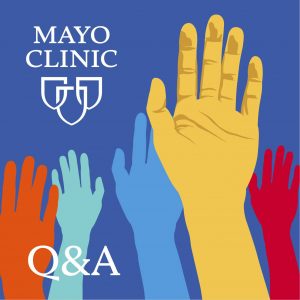-
Health & Wellness
Mayo Clinic Q&A podcast: Advocacy groups can help patients, physicians connect

Patient advocacy and support organizations play an important role for patients suffering with diseases or conditions. The goal of these groups is to connect members with others who may be in similar situations and locate resources to manage or treat their condition. But patients aren't the only ones who benefit from these connections. Physicians and researchers also can benefit from getting involved.
"Taking care of patients is my passion," says Dr. A. Noelle Larson, a Mayo Clinic orthopedic surgeon. "So it really comes naturally to be interested and involved in my patients' lives."
Dr. Larson's clinical and research focus is scoliosis. She has become involved with Curvy Girls Scoliosis, a global support group. Two years ago, she attended their national meeting. Spending time with families and children affected by scoliosis gave Dr. Larson a new perspective.
"So often, our encounter in clinic is quite short, and you don't get a sense of the impact of what our treatment has on that child's overall life and well-being," explains Dr. Larson. "These patients know more about living with their condition than the physician does at some level."
Beyond the connections patients and physicians make, the medical community benefits in other ways, as well. Support groups can help organize and inform patients about clinical trials that can lead to innovation.
Dr. Larson has seen this in her own practice. Feedback from patients led to a Mayo Clinic study on vertebral body tether implant as a surgical alternative to fusing the spine.
"That partnership between the families, the patients, and the researchers and doctors, all working together is really critical," says Dr. Larson. "If we really want to make new drugs, new devices, and new treatments, we all have to work together. Because at the end of the day, we all want to get to the same place, which is better care for patients."
On the Mayo Clinic Q&A podcast, Dr. Larson discusses the role of advocacy groups and the patient-physician connection.
Watch: Dr. Larson discuss how physicians benefit from patient advocacy groups.
For everyone's safety, Mayo Clinic has strict masking policies in place. Anyone shown without a mask was recorded prior to COVID-19 or recorded in an area not designated for patient care, where social distancing and other safety protocols were followed.
For more information and all your COVID-19 coverage, go to the Mayo Clinic News Network and mayoclinic.org.

Related Articles







